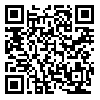Fri, Feb 20, 2026
[Archive]
Volume 7, Issue 3 (11-1993)
Med J Islam Repub Iran 1993 |
Back to browse issues page
Download citation:
BibTeX | RIS | EndNote | Medlars | ProCite | Reference Manager | RefWorks
Send citation to:



BibTeX | RIS | EndNote | Medlars | ProCite | Reference Manager | RefWorks
Send citation to:
NAKHJAVANI M, BASTANHAGH M H, KASSAYAN R, ESHTIAGHI R, ASADI A, RAJAI M. A STUDY OF 765 CASES OF CLINICALLY SOLITARY COLD THYROID NODULES FROM AN IODINEDEFICIENT AREA. Med J Islam Repub Iran 1993; 7 (3) :145-150
URL: http://mjiri.iums.ac.ir/article-1-1420-en.html
URL: http://mjiri.iums.ac.ir/article-1-1420-en.html
MANOOCHEHR NAKHJAVANI 
 , MOHAMMAD HASAN BASTANHAGH
, MOHAMMAD HASAN BASTANHAGH 
 , REZA KASSAYAN
, REZA KASSAYAN 
 , RADINA ESHTIAGHI
, RADINA ESHTIAGHI 
 , AFSAR ASADI
, AFSAR ASADI 
 , MOHAMMAD RAJAI
, MOHAMMAD RAJAI 


 , MOHAMMAD HASAN BASTANHAGH
, MOHAMMAD HASAN BASTANHAGH 
 , REZA KASSAYAN
, REZA KASSAYAN 
 , RADINA ESHTIAGHI
, RADINA ESHTIAGHI 
 , AFSAR ASADI
, AFSAR ASADI 
 , MOHAMMAD RAJAI
, MOHAMMAD RAJAI 

From the Department of Internal Medicine, Division of Endocrinology and Metabolism, Tehran University of Medical Sciences,
Abstract: (5064 Views)
We studied the clinical, radioisotopic, and pathologic characteristics and the
incidence of cancer in clinically solitary cold nodules of the thyroid in an iodinedeficient
area. The study included retrospective analysis of 765 patients who
underwent thyroidectomy for a clinically single cold nodule in a ten-year period. We
compared the pathological findings with clinical data. In pathological examination,
34% of glands were multinodular. The incidence of nodular colloid goiters were
81.7% and of thyroid cancer 10.2%. Thyroid malignancy increased significantly
after age thirty (p<0.005). The incidence of cancer was 8.3% in true solitary nodules
versus 13.8% in clinically solitary nodules found to be pathologically multinodular
(p<0.05). Papillary carcinoma was the most frequent type (70.5%) and medullary
carcinoma the least frequent type (2.6%). Benign nodular lesions were the most
common cause of cold nodules. There was no sex difference in the incidence of
thyroid cancer. In the patients with thyroid carcinoma the percentage of multinodular
glands was higher. Iodine deficiency may be a factor in changing certain characteristics
of thyroid nodules.
Type of Study: Original Research |
Subject:
Internal Medicine
| Rights and permissions | |
 |
This work is licensed under a Creative Commons Attribution-NonCommercial 4.0 International License. |



